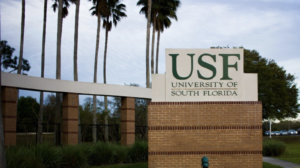Faculty voice concerns, demand consolidation answers

The future of USF post-consolidation remains unsettled and unsettling for many faculty members from the Tampa, St. Pete and Sarasota-Manatee campuses.
In a moderated forum hosted by the Faculty Senate on Monday, professors and staff were able to voice concerns about future issues that might arise before the plan goes into effect July 1, 2020.
The “lack of guidance from administration” and the uncertainties on the next steps in the consolidation process were the topics most discussed in the forum held in the Marshall Student Center Ballroom.
In a room composed primarily of department chairs, each speaker was given three minutes to express ideas, concerns and comments about consolidation.
Jody Harwood, chair of the department of integrative biology at the Tampa campus, expressed her frustration about not having a model to follow to consolidate the biology departments on all three campuses.
The biology department has 2,000 students majoring in its curriculum on the Tampa campus while St. Pete has 750, according to Harwood. She said the biology department will be “affected at its core” due to different missions in terms of research, teaching, structures and assignments across different campuses.
“We have no model, we have no guidance and we have a lot of skepticism and anxiety about how this is going to work,” Harwood said. “There’s unknown on every side of this, but the sooner that we can get some clarity, the better.”
The consolidation plan consists of unifying USF’s three campuses — Tampa, St. Pete and Sarasota-Manatee — to operate under a single accredited institution. In addition, USF’s 13 colleges will be unified under one structure shifting authority from the branch campuses to Tampa.
This raised concerns in the room of about 100 faculty members.
With a small audience at the forum, Harwood made note of the unfilled room.
“Regardless of the attendance, I hope that the administration doesn’t think that this is a sign of disinterest from faculty,” Harwood said. “I think more like a tug of war, where we have been back and forth, up and down with so many possibilities, speculations and uncertainties about consolidation on all three campuses.”
Mark Rains, director of the school of geosciences on the Tampa campus, is fearful of the amount of power that could be given to each department during the consolidation process.
“What keeps me awake at night is the question of ‘how much say do I actually have?’” Rains said. “At some point, someone’s going to make a decision. And I want to know how much say I have with that decision? Or do I just wake up one morning and they say, ‘it’s a done deal.’”
The latest consolidation update was provided by USF President Steven Currall on Sept. 10 at the Board of Trustees (BOT) meeting.
The plan received backlash from state officials as well for giving too much authority and power to the Tampa campus, according to the Tampa Bay Times.
In an article, Sen. Darryl Rouson (D-FL) from St. Pete voiced his concern that branch campus students would be forced to discuss their academics with administration in Tampa.
However, other St. Pete representatives said there are more positive aspects of consolidation to consider.
Deanna Michael, associate professor at the college of education in St. Pete and BOT trustee, attempted to shift the tension in the room and spoke about the benefits consolidation can provide.
“This is an opportunity for us to come together,” Michael said. “It’s an opportunity to look at our governance documents and to be a voice representing the USF community.
“Those fears can be answered through administrative and faculty governance.”
In an interview with The Oracle, Currall said he has been meeting with faculty and staff from St. Pete and Sarasota-Manatee to “make sure that people’s voices are heard.” An updated version of the consolidation plan is underway and is expected to be finalized in approximately three to six weeks.
“We’re working with all stakeholders across all three campuses to further refine and articulate the plan going forward and, in the next four to six weeks, there will be more information coming out refining our plans and addressing a number of issues that came out today from the discussions with the faculty,” Currall said.








